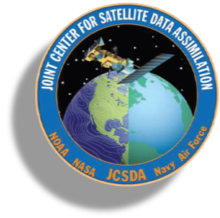17th JCSDA Technical Review Meeting and Science Workshop
Washington, DC
May 29 - 31, 2019
Meeting Homepage Website with links to presentations, posters, and the agenda.
Venue
NASA Headquarters
NASA Headquarters Auditorium and Atrium
300 E Street S.W. (between 3rd and 4th Streets)
Washington, DC 20546-0001
(202) 358-0000
See more information about the venue
Introduction
The JCSDA supports development of science to accelerate and optimize assimilation of satellite data in operational environmental prediction systems. The Partner agencies conduct some of this research internally, and the JCSDA supports external research via competitively awarded grants and contracts to the broader scientific community. It is essential that all of these efforts be complementary to and coordinated with one another.
The Annual JCSDA Technical Review Meeting and Science Workshop facilitates this coordination and the assessment of current and planned scientific development. Lasting 2 ½ days, the Meeting provides ample time for informal scientific discussions as well as for formal presentations. Scientists and managers from all of the JCSDA partners participate, and the results and discussions of the Meeting are used to plan future efforts
JCSDA research encompasses six priority areas approved by the Science Steering Committee:
Radiative Transfer Modeling
Preparation for assimilation of new data and data from new instruments
Assimilation of satellite data impacted by clouds and precipitation
Assimilation of land surface satellite observations
Assimilation of ocean surface satellite observations
Atmospheric composition; chemistry, and aerosols
In practice, the JCSDA manages its research efforts through a set of team-based Projects:
Community Radiative Transfer Modeling (CRTM)
New and Improved Observations (NIO)
Sea-ice, Ocean, and Coupled data Assimilation (SOCA)
Joint Effort for Data assimilation Integration (JEDI)
Impacts of Observing Systems (IOS)
Organization and Programming of the Meeting
The 17th JCSDA Technical Review Meeting and Science Workshop will feature both oral and poster presentations. To promote awareness across all projects, no parallel sessions will be held. The agenda will provide time for every presenter to interact with the audience. Contributed and invited talks will address all current Projects and Scientific Priority Areas, as well as emerging ones. All JCSDA-funded external scientists are expected to attend to give an oral presentation summarizing their progress and plans for the coming year.
The agenda will include dedicated times for reviewing and discussing posters. However, posters will be mounted at the beginning of the meeting and will remain on display until through the conclusion, so participants can view and discuss the posters during breaks.
Registration
All Workshop participants must be registered. Note that there is no registration fee for the Meeting and Workshop.
Registration is closed.
Location
The 17th JCSDA Technical Review Meeting & Science Workshop on Satellite Data Assimilation will be held at the NASA Headquarter Building Auditorium in Washington, DC. This location offers convenient access to the Washington DC Metro public transportation system.
Meals
Everyone will be responsible for their own lunch and dinner. A light breakfast and coffee break will be provided Wednesday through Friday. See restaurants close to the venue.
Anyone attending the workshop is also welcome to eat at any of the NASA Headquarters cafeterias for lunch. More details are coming soon.
Other Logistical Information
Additional information will be provided in subsequent announcements, including:
Access to the NASA Headquarters Auditorium
Arrangements for snacks and meals
Remote Participation
Intermediate and Final Agenda
Online posting of talks and posters
Please also see the Venue Information and the Lodging Information pages.
Map and Directions
See NASA Headquarters Map and Directions
Meeting Contact Information
For questions, concerns or comments regarding workshop logistics, please contact Katherine Shanahan via email kshan@ucar.edu or by phone 303-497-8649.
